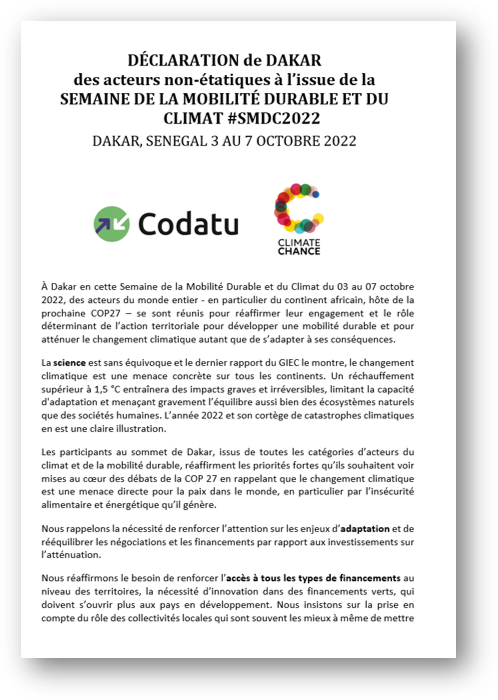After more than 40 years of work, discussions, research, and conferences, that have brought together a wide variety of stakeholders from the urban mobility sector in emerging and developing countries (policymakers, practitioners, academics, experts, international donors, NGOs…),
After the CODATU declaration in Lomé in 2002, which put forward principles and actions to inform urban mobility policies, and the CODATU declaration at the Habitat III World Summit, which advocated for “the accessibility that we need”,
In view of the significant challenges that lie ahead for cities from the South, including urban, energy and digital transitions, social and climate transformations, globalization and metropolization, and pandemics,
Recognizing that urban mobility has become a priority issue in the cities from the South, on which national and local public authorities are particularly expected, and with rippling effects on the institutions’ themselves if not catered for; and convinced that urban mobility is an essential component to fight against climate change and the significant pollution levels found in every agglomeration,
Given the urgency to capitalize on the experience of cities that have long been confronted with issues of mobility, to avoid repeating the mistakes of the past, and to adopt effective and virtuous public policies, it is necessary to implement policy measures that are nowadays widely acknowledged: integrated mobility and urban planning, centered on people and their needs, limiting private car use; strengthening of political institutions and coordination mechanisms between city stakeholders; search for and implementation of a perennial financing model for public transport systems that face a constant need for development; integrated investments following a multimodal approach of mobility that takes properly into account active modes and urban pollution; recognizing the importance of the paratransit (informal) sector and integrating its professionalized operators within a multimodal system; creating local observatories to gather core data on urban mobility; taking into account the much needed safety and gender questions in the professional transport sector and tackling sexual and sexist harassment;
Convinced that urban mobility, both of people and goods, is an essential component to fight against climate deregulation, hold global warming below 1,5°C as stated in the Paris Agreement, and hinder the significant pollution levels found in every agglomeration.
The following roadmap is adopted by CODATU as a result of the Dakar Conference held from the 3rd to the 7th of October 2022. Relevant for the next decade, the proposed action plan will be monitored via an observatory, to be immediately set up by CODATU and its partners. Its purpose will be to analyze on the ground the implementation of all the recommendations.

